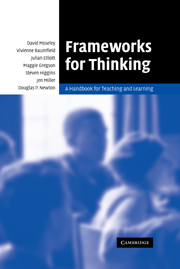Book contents
- Frontmatter
- Contents
- List of figures
- List of tables
- Notes on authors
- Foreword
- Acknowledgments
- Introduction
- 1 The nature of thinking and thinking skills
- 2 Lists, inventories, groups, taxonomies and frameworks
- 3 Frameworks dealing with instructional design
- 4 Frameworks dealing with productive thinking
- 5 Frameworks dealing with cognitive structure and/or development
- 6 Seven ‘all-embracing’ frameworks
- 7 Moving from understanding to productive thinking: implications for practice
- References
- Index
5 - Frameworks dealing with cognitive structure and/or development
Published online by Cambridge University Press: 22 September 2009
- Frontmatter
- Contents
- List of figures
- List of tables
- Notes on authors
- Foreword
- Acknowledgments
- Introduction
- 1 The nature of thinking and thinking skills
- 2 Lists, inventories, groups, taxonomies and frameworks
- 3 Frameworks dealing with instructional design
- 4 Frameworks dealing with productive thinking
- 5 Frameworks dealing with cognitive structure and/or development
- 6 Seven ‘all-embracing’ frameworks
- 7 Moving from understanding to productive thinking: implications for practice
- References
- Index
Summary
Introduction
This family group consists of a set of frameworks that are less easily contained within a single defining category. All but two (Belenky, and King and Kitchener) were developed by psychologists, but they differ considerably in aims and epistemological assumptions. Some were developed by interpreting interviews and questionnaires, while others reflect the content of psychometric test batteries, especially intelligence tests. Some deal with thinking across the lifespan, while others are specifically concerned with how adults think. Finally, the frameworks differ to the extent that they emphasise genetic or environmental influences. What ties them together, however, is that they are predominantly concerned with the nature of cognition; its structure and development.
The influence of psychological theories about thinking and learning extends across disciplines and can be recognised in the fields of instructional design and productive thinking which are covered in Chapters 3 and 4. Here we draw attention to some major figures in academic psychology, some of whom (like Piaget and Gardner) have had a major impact on educational theory and practice. Others have had relatively little impact, perhaps because they have pursued ideas for their own sake rather than being constrained by political correctness or fashion.
One subgroup of authors (Carroll, Guilford and Gardner) focus on identifying what constitutes ‘intelligence’. Carroll and Guilford employ factor analytic techniques to identify underlying components of intelligence tests, but come up with very different results.
Information
- Type
- Chapter
- Information
- Frameworks for ThinkingA Handbook for Teaching and Learning, pp. 185 - 249Publisher: Cambridge University PressPrint publication year: 2005
